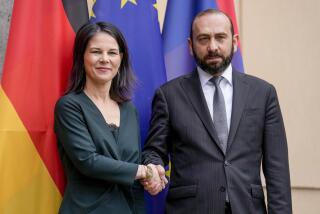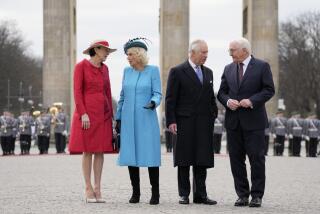Chipping Away at the Wall
- Share via
East German leader Erich Honecker’s visit to West Germany is, by ordinary standards, proving to be a ho-hum affair. It has aroused little excitement among West Germans. And the 13-page communique issued Tuesday reflected no breakthroughs--or, indeed, any significant progress--on the fundamental differences that divide the two Germanys. Both Honecker and West German Chancellor Helmut Kohl attach great symbolic importance to the visit, however, and it could be that they are right.
Honecker, a hard-line Communist who has led East Germany to impressive economic accomplishments, is the first East German head of state to be received in Bonn since the division of Germany after World War II.
The leaders of the two Germanys looked on Tuesday as agreements on cooperation in science, the environment and nuclear safety were signed. They joined in declarations of mutual interest in arms reduction and the maintenance of peace in Europe. On issues on which they are in fundamental disagreement, however, neither side budged.
Honecker flatly rejected a proposal that both Germanys work toward national reunification. He ignored a plea from Kohl to tear down the Berlin Wall, and apparently avoided any permanent commitment to stop shooting would-be escapees. The West German chancellor, in turn, brushed off Honecker’s demand for formal diplomatic recognition of East Germany.
The potentially historic importance of the trip, however, lies in the fact that it occurred at all--and in the trappings of respectability that it conferred on the East German regime.
West Germany recognizes East Germany as a separate state but not as a legitimate nation. Just a few years ago the visit of an East German leader to Bonn would have been unthinkable. Honecker’s reception shows how much things have changed.
Diplomatic recognition is still not in the offing, but the visiting East German was treated with almost all the respects accorded any other visiting chief of state--including the flying of the East German flag and the playing of its national anthem. For Honecker, those are precious gains.
The West German government likes to think that the visit serves to encourage pressures in East Germany for more respect for human rights, and to keep alive in East German breasts the long-term goal of reunification. There is also the hope, realistic or not, that the East Germans can play a helpful role on arms control and other issues. Time will tell who is using whom to best advantage.
More to Read
Sign up for Essential California
The most important California stories and recommendations in your inbox every morning.
You may occasionally receive promotional content from the Los Angeles Times.













